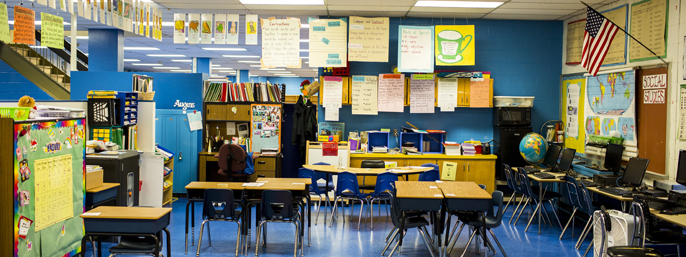I have a shocking confession: I am a Success Academy parent. Imagine my relief, then, when I read the New York Times’ recent article about Success, which marshals a flurry of criticisms about the charter network’s apparently heartless, “no excuses” approach to teaching.
Finally, I thought to myself, I’ll have an excuse to tell my son that he will be moving to the district school that is much more conveniently located down the street. No more shuttling back and forth on the subway to get him to school. No more arguing with him literally every morning as he pleads to get to school early—“Isn’t Dad ready yet? I want extra time at school today!” And this’ll be the last time I’ll have to explain to him, amidst tears streaming down his face, why he has to miss Number Stories because Wednesday at 11 am is the only time I can get him a doctor’s appointment.
Thankfully, I will no longer have to field phone calls from his teachers during the middle of my work day: “Ms. Rozman, I just wanted to tell you that Benjamin did a really good job sharing his strategy today and was very proud.“ No more texts with updates like, “Benjamin had a headache today so he got some water and put his head down and rested for a while, and he said he felt better,” or notecards from teachers cluttering my mailbox (“Thanks for all you do to support Benjamin in getting to school and turning in his homework.”) Phew. Never mind that Success Academy schools across the city have shown tremendous gains for students, often helping them meet state learning standards at double and triple the rates of other schools. Who needs a school like that?
In all seriousness, though, no doubt there are parents who feel that Success’ approach to teaching and learning is not a good match for their child. No one should press these parents to send their children to such a school—nor should they be forced to praise teaching methods with which they disagree. There are plenty of exceptional schools around—charter, district and private—and chances are, none of them works for every kid. In my neighborhood, for example, there’s a great district school with all-inclusion classes, where every class is comprised of 50 percent special education students and 50 percent general education students. Parents vie for the coveted spots there. Just like Success, it’s a terrific option for many families and their children, but there are also parents I know who feel it’s not the right fit for them.
And that’s fine! The point is, every parent should have the right to make choices about their child’s schooling, and every parent should have good options from which to choose—not just parents who can afford to do so, and not just those who win a charter school lottery. But I can’t help but feel that there is an implicit assumption in education debates that parents whose children are primarily served by charter schools like Success—who tend to be low-income students of color—aren’t capable of making those choices, or have somehow been duped into buying into these schools’ philosophies. As though those parents, of those children, don’t understand the kind of schools they’re subjecting their children to.
That’s deeply biased and flat-out wrong. I think we can safely say that the thousands of parents who descended on Albany recently, advocating for their children’s rights to stay in Success Academies, or the parents of the 20,000+ children who enter the lottery for spots in Success Academy schools each year, haven’t been hoodwinked. They’re making real, informed choices—just like I do—about what they want for their kids.
There are lots of urgent conversations to have about how to provide every child with an education that meets their needs, and no one type of school is going to be the answer. We should absolutely be having those conversations. But there is simply too much work to do, making sure every kid has options for a great education that works for them, for us to spend time tearing down the methods used in any one kind of school—particularly when those methods have satisfied thousands of parents and shown strong results for many of the city’s students.
Instead, let’s tackle another, far more real problem: making sure no parent’s choices are limited to schools where their children are pretty much guaranteed to fail. In the meantime, I will bear the burden of my kid loving Success Academy.


